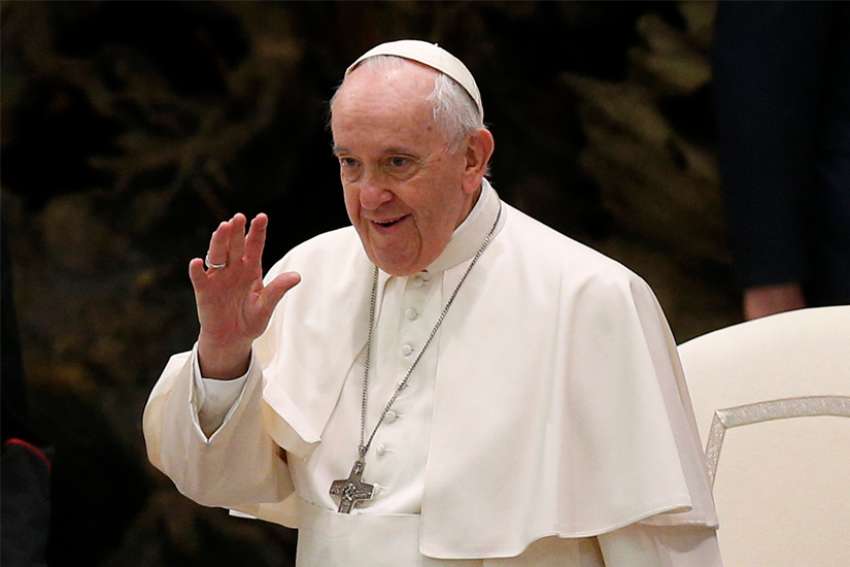The era of synodality in the Catholic Church has put three Canadian university students in conversation with Pope Francis.
“One thing I love about Pope Francis is that you don’t feel like you’re talking to the Pope,” Claudia De Fazio, Waterloo University management engineering student and don in residence at St. Jerome’s University, told The Catholic Register after an hour-long online conversation between Pope Francis and university students from North and South America. “Obviously you know you’re talking to the Pope, but there’s a friendship there that he just kind of embodies. It’s his humility.”
Pope Francis concluded the Feb. 24 event thanking the students.
“Maybe some of the things I have said were good to you, but I assure you that what you told me was very good to me. I come out of here being very different than the way I came in,” Francis said, speaking in Spanish. “Your words give us hope to continue this process. Meeting with you gives us a possibility to build bridges now and in the future.”
Organized mainly out of Loyola University, the Jesuit school in Chicago, with the assistance from the Pontifical Commission for Latin America, Building Bridges North-South has been a months-long conversation in English, Spanish and Portuguese involving dozens of students representing universities throughout the Americas. The student synod was focused on migration issues, but the discussion with Pope Francis ranged from climate change to frustrations with bishops to Indigenous issues and poverty.
With both the Americans and many of the Latin American students focused on U.S. immigration policy, the three Canadians found themselves on the sidelines as the weekly meetings got closer to the final encounter with Pope Francis. University of St. Michael’s PhD candidate in historical theology Mia Theocharis felt the Canadians were “just kind of an afterthought.”
“I felt like Canadian issues weren’t really addressed at all,” said Brendan Whittle, a St. Jerome’s psychology and business major and SJU student union president.
But talking to students from Brazil, Argentina, Honduras and the United States was still valuable, said De Fazio.
“There was good discussion from some of the groups about Laudato Si’. That is super-relevant to us as Canadians,” she said.
None of the Canadians were chosen to address Pope Francis directly on the call. But all three back the proposal made by several speakers that some sort of synodal process involving the Pope continue as an annual event.
“I definitely see this as the starting point,” said Theocharis.
“This would be an amazing thing to build off of, to see a yearly connection or conference of Catholic university students,” said De Fazio.
But the students also want to fill in the gap between them and Pope Francis with discussions involving Canadian bishops.
“I think there’s definitely something we can do as we look at the Canadian context specifically, linking up Canadian bishops with Catholic university students,” said Theocharis.
“We shouldn’t be scared to talk to our bishops, or scared to talk to people of higher authority than us,” said De Fazio. “At the end of the day, we’re all human.”
“I’m sure they (bishops) don’t interact with students as much as they do with other priests and such,” said Whittle. “They will take action in some form if we engage with them.”
It’s all part of a synodal reality that the Church must face, said Theocharis.
“Church cannot move forward without this synodal process,” she said. “Synodality is essential to the progression of the Church, where the Church stands in our world today and in the future.”
“It (the Church) needs to be synodal to prolong its own life,” said Whittle.
Francis urged students to do more than hit the books.
“What do we expect from university students?” the Pope asked.
“That they go down into the road. That they commit themselves. That they show their faith.”
That demand for concrete action working with migrants, the poor, Indigenous people and fighting for the environment resonates with students, said De Fazio.
“We have students who are dedicated to organizing and getting volunteers. We currently volunteer at two soup kitchens in Waterloo. One is Tiny Homes (Community KW) and then one is more — mainly we make pizzas. And then another is a more a traditional soup kitchen,” she said. “It’s getting students out into the community and seeing the realities of poverty in our area.”
Francis urged students to look for opportunities to build bridges.
“Christ came to be the bridge between God the Father and us. A Christian who does not build bridges, it means they have forgotten their own baptism. Because to build bridges is part of our vocation.”


